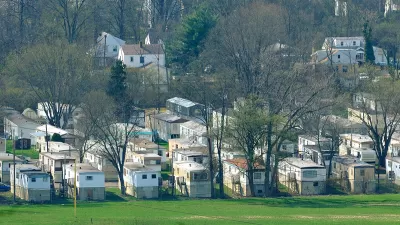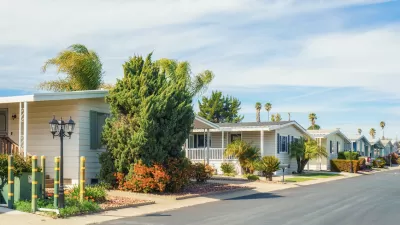Longtime residents of mobile home parks are seeing their land rents go up as corporate investors seek to increase profits, aided in part by federally-backed loans.

Mobile home parks have long served as an affordable option for homeownership for many Americans, with 3 million households residing in manufactured home communities around the country. But more recently, big investors are buying up these parks and raising the land rent, leading to eviction fears for many low-income residents who own their home, but not the land it sits on. Sylvie Douglis reports on the changes affecting residents as ownership of mobile home parks shifts from mom-and-pop operations to real estate investors looking to increase profits with higher rents and new utility fees.
Known widely as "mobile" homes, manufactured homes, in fact, rarely move. The cost to relocate a mobile home runs from $5,000 to $10,000, a price point unaffordable to most owners. "In the past few years, hundreds of parks have been bought up by big corporations" looking to make bigger profits. As rents go up, the park's value rises, and "the investor then refinances the mobile home park and takes out a big loan" at a low interest rate–largely thanks to federally backed Fannie Mae and Freddie Mac loans. Despite their stated goal of helping more people afford homes, these agencies provided over $5 billion in government-backed loans to big mobile home park investors last year alone.
Meanwhile, residents who want to buy their own land struggle to get federal assistance. Although some states have a "right of first refusal" that gives residents the right to buy a mobile home park when it goes up for sale, "when the residents of a mobile home park want to buy their own park, they almost never get a super cheap loan backed by Fannie and Freddie, generally because the co-ops don't have the cash for a big enough down payment." Changing this, says Andy Danforth, "would change the game. Residents could get easier access to loans at much lower interest rates, so they'd be more able to afford to buy up their own parks. A lot more parks could turn into co-ops."
FULL STORY: Mobile Home Parked

Maui's Vacation Rental Debate Turns Ugly
Verbal attacks, misinformation campaigns and fistfights plague a high-stakes debate to convert thousands of vacation rentals into long-term housing.

Planetizen Federal Action Tracker
A weekly monitor of how Trump’s orders and actions are impacting planners and planning in America.

Chicago’s Ghost Rails
Just beneath the surface of the modern city lie the remnants of its expansive early 20th-century streetcar system.

Bend, Oregon Zoning Reforms Prioritize Small-Scale Housing
The city altered its zoning code to allow multi-family housing and eliminated parking mandates citywide.

Amtrak Cutting Jobs, Funding to High-Speed Rail
The agency plans to cut 10 percent of its workforce and has confirmed it will not fund new high-speed rail projects.

LA Denies Basic Services to Unhoused Residents
The city has repeatedly failed to respond to requests for trash pickup at encampment sites, and eliminated a program that provided mobile showers and toilets.
Urban Design for Planners 1: Software Tools
This six-course series explores essential urban design concepts using open source software and equips planners with the tools they need to participate fully in the urban design process.
Planning for Universal Design
Learn the tools for implementing Universal Design in planning regulations.
planning NEXT
Appalachian Highlands Housing Partners
Mpact (founded as Rail~Volution)
City of Camden Redevelopment Agency
City of Astoria
City of Portland
City of Laramie





























